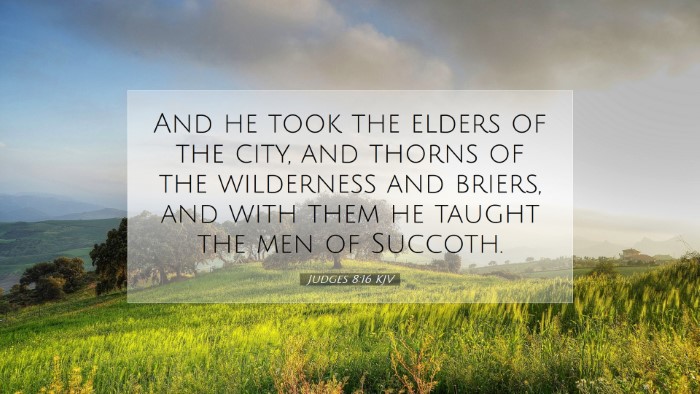Commentary on Judges 8:16
Judges 8:16 states, "And he took the elders of the city, and thorns of the wilderness and briers; and with them he taught the men of Succoth." This verse captures a pivotal moment in the narrative of Gideon, a central figure in the Book of Judges. The significance of this moment is deeply enriched through insights drawn from public domain commentaries.
Contextual Overview
The context of this passage lies in Gideon's campaign against the Midianites, where he seeks retribution against the towns that refused to aid his cause. The town of Succoth, chosen for its lack of support, becomes a focal point of Gideon's journey.
Matthew Henry’s Insight
In his commentary, Matthew Henry emphasizes Gideon’s leadership characteristics, noting that his actions reflect a balance between justice and mercy. Henry elaborates on the severity of Gideon’s response to the men of Succoth, illustrating the importance of covenant loyalty among the Israelites. Gideon’s decision to use “thorns of the wilderness and briers” metaphorically underscores the harshness of their betrayal.
Albert Barnes’ Interpretation
Albert Barnes offers an extensive discussion about the symbolism of the thorns and briers. He suggests that these materials represent the discomfort and pain that come from turning against God’s chosen leaders. Barnes interprets Gideon’s actions as a means of demonstrating the serious consequences of inaction in times of spiritual warfare. This engagement with Succoth serves to highlight the need for unity and support among God’s people.
Adam Clarke’s Exegesis
Adam Clarke provides a detailed exploration of the geographical and cultural context of Succoth. He points out that Succoth, being a town that should have supported Gideon, instead chose self-preservation. Clarke delves into the meaning of “taught the men of Succoth,” interpreting this teaching as a form of discipline directed towards encouraging loyalty among the Israelites. Clarke underscores that Gideon’s choice of instruction through humiliation was designed to reinforce the importance of supporting divinely appointed leaders.
Thematic Reflections
Several themes emerge from Judges 8:16 that are pertinent to pastors, students, and scholars alike.
-
The Importance of Leadership:
The incident emphasizes the weight of leadership responsibilities. Gideon, as a leader, is tasked with ensuring the loyalty and engagement of the tribes in his campaign against the Midianites. His actions call attention to how leaders must sometimes confront their followers to maintain unity and motivation.
-
Covenant Fidelity:
The repercussions faced by the men of Succoth accentuate the theme of fidelity to God’s covenant and to those He appoints. This passage acts as a reminder that loyalty to God’s work is not passive and requires active participation from the community of believers.
-
Symbolism of Thorns:
Thorns serve as a vivid symbol of rejection, betrayal, and the natural consequences of turning away from God’s purpose. The choice of this teaching method illustrates that sometimes God’s corrective measure may come through discomfort, urging believers to remember their responsibilities.
Applications for Modern Believers
For contemporary believers, the lessons drawn from this passage are profound.
-
Active Engagement:
Believers are called to actively engage in leadership and support efforts within their communities and churches. In moments of trial or spiritual need, standing firm and providing aid becomes a testimony of faithfulness.
-
Disciplinary Guidance:
The necessity of discipline in the church context cannot be overlooked. Churches today must balance grace with accountability, ensuring that loving corrections are not seen as punitive but as guidance towards spiritual growth.
-
Recognizing God’s Leadership:
It is vital for believers to recognize and support the leaders God has placed in their lives, as doing so is equivalent to honoring God's sovereignty in leadership.
Conclusion
Judges 8:16 serves as a powerful reminder of the dynamics of leadership and the communal responsibilities believers possess towards one another. Through the insights of Matthew Henry, Albert Barnes, and Adam Clarke, we are encouraged to reflect on our commitments to God, our leaders, and fellow believers. The thorns, which Gideon used as teaching tools, remind us that in times of betrayal, there are lessons learned that can lead us back to unity and purpose in serving God.


